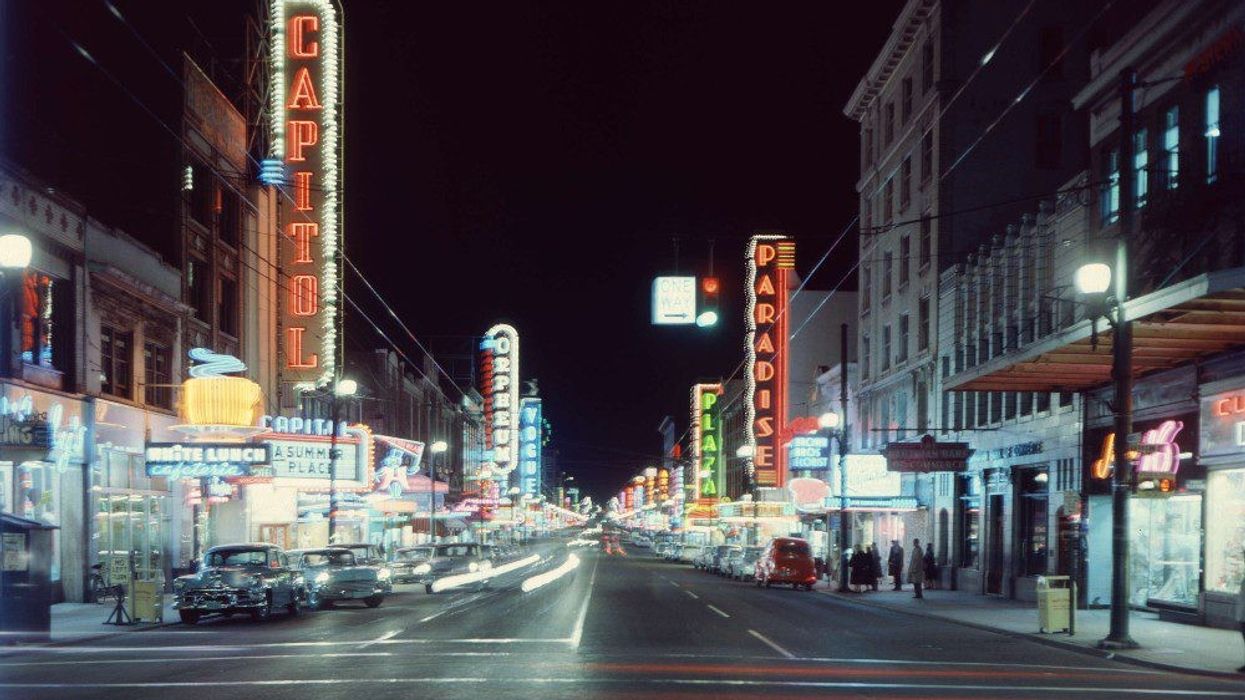On Tuesday, January 31, Vancouver City Council voted in favour of the Granville Street Planning Program that will guide the future of one of the most historic entertainment districts in Vancouver.
This plan, according to a City report recommending the project, will develop "a new vision for Granville Street and the Granville Entertainment District that will help to re-establish Granville as an exciting, welcoming, safe, and inclusive downtown destination."
Additionally, it will focus on economic development, cultural revitalization, new entertainment opportunities, preservation of the area's heritage, improving public spaces, and examining potential opportunities to add housing to the area.
Much of this, the City says, will be accomplished via an extensive review of existing policies governing land use, zoning, development, and design in the area. Everything that's currently in place is essentially on the table to be examined, and the goal is to identify changes that can be made to support the City's arts and culture scene and improve its night-time economy.
Those are the objectives.
To understand the impetus, however, and why Granville Street even needs a "renewal," we have to look back at the history of the area.
Granville Street: The History
Did you know that before Vancouver was called Vancouver, it was called Granville?
The name refers to Granville Leveson-Gower, a British Liberal politician who was the Secretary of State for Foreign Affairs for nearly two decades before the city was officially incorporated as Vancouver in April 1886.
To continue honoring Leveson-Gower, one of the city's main streets was renamed as Granville Street, which by then had been announced as the west coast terminus for the Canadian Pacific Railway, securing the area's importance into the future.
However, in June 1886, two months after Vancouver was incorporated, an enormous fire burned through most of the city, bringing most of it to the ground within an hour in what's now called the Great Vancouver Fire.
That fire ended up being a minor setback before a major comeback, as Vancouver quickly rebuilt itself to be better than it was before, with new additions like modern utilities and streetcar systems. By May 1887 -- less than a year after the fire -- the Canadian Pacific Railway (CPR) had arrived, and the rest of the world came along with it.
At the time of the Great Vancouver Fire, Vancouver's population was estimated at about 1,000 people. According to Statistics Canada's historical census data, the population boomed to 13,685 by 1891. By 1901, the population had nearly doubled to 27,010.
Granville Street and Downtown Vancouver became more accessible from the suburbs after the Granville Street Bridge was completed in 1889, connecting Beach Avenue to 3rd Avenue across False Creek. It was then replaced by a larger version that extended from Pacific Street to 4th Avenue in 1909. (The third and current version was completed in 1954.)
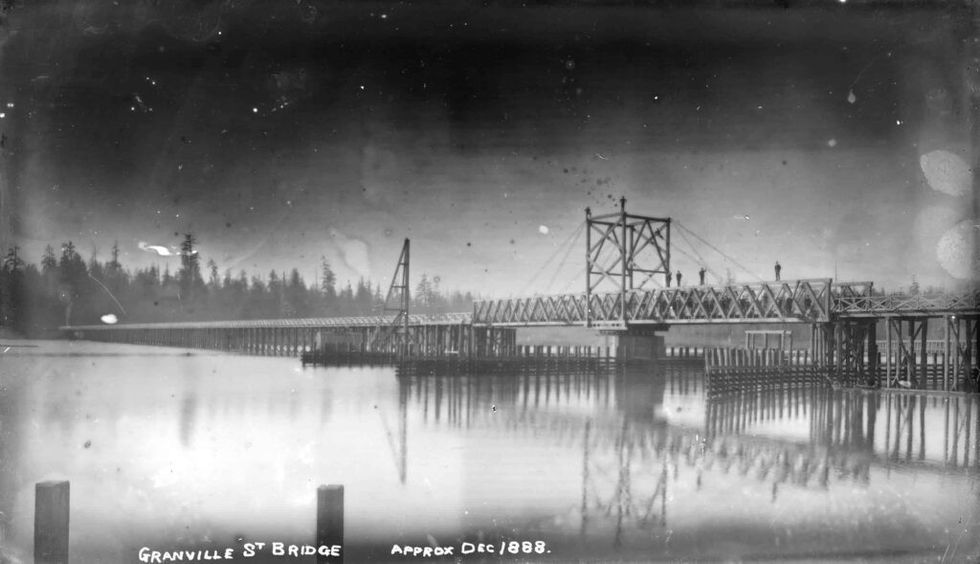
By then, the CPR had become one of the biggest land owners and developers in Vancouver, particularly in the area between Waterfront Station, which opened in 1914, and the Hotel Vancouver, which opened in 1916. (The Fairmont Hotel Vancouver standing today is the third hotel to use the name.)
Every major metropolitan city has a street where everybody has visited, where all the famous bars and theatres and nightclubs are located, where the abundance of neon-lit marquees mean the street shines brightest at night. In New York City, it's the stretch of Broadway between 42nd and 47th Street -- also known as Times Square. In Los Angeles, it's Hollywood Boulevard. In Toronto, it's Yonge Street.
With the advent of streetcars making Downtown Vancouver even more accessible to the suburbs, Granville Street became that iconic street for Vancouver by the middle of the 20th century, becoming the home of upscale boutiques, hotels, and entertainment. Most notable was what became known as Theatre Row, which included -- among many others -- the Vancouver Opera House, the Vogue, and the Orpheum, the latter two of which are still standing today.
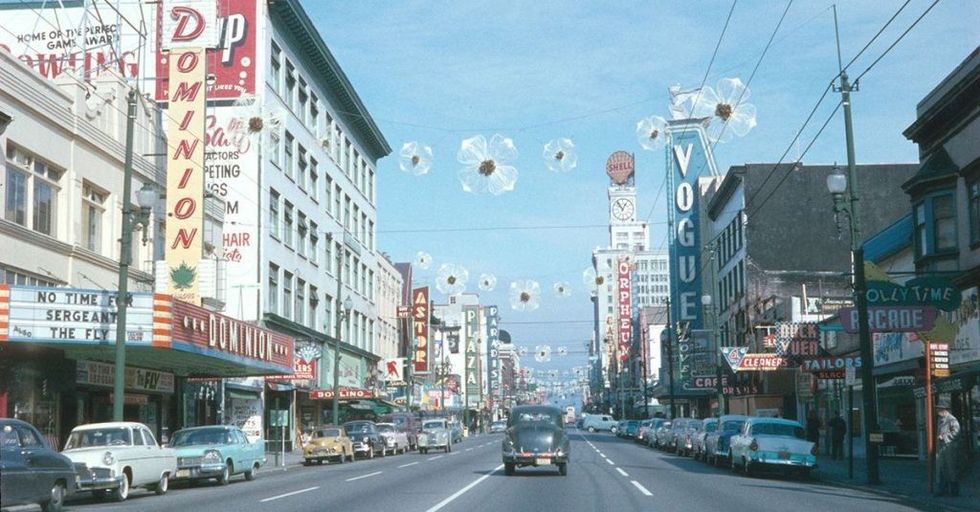
Movies soon took over entertainment districts, including Granville Street, which saw single-screen cinemas like the Dominion and the Capitol Theatre torn down and converted into multi-screen theatres. But again tides changed, this time as a result of liquor licenses.
"The City of Vancouver unveiled its vision for a two block stretch of Granville Street as an entertainment district, [and] to accomplish this they [were] encouraging the relocation of liquor licenses from other parts of town to Granville Street," says the Heritage Vancouver Society. "But this has had an unforeseen impact on what made Granville Street special in the first place: Theatres [were] now seen as being more profitable as nightclubs."
In the 1960s, the City wanted to redevelop the downtown area, worrying that it was losing its appeal to suburban malls, and set their sights on Georgia and Granville Street, according to Eve Lazarus, author of Sensational Vancouver.
Hence, the Pacific Centre mall joined the fray in the early 1970s, and smaller businesses on Granville Street suffered as a result. That was even despite Pacific Centre earning the unflattering nickname as "The Un-Ending Urinal Wall" because of its marble-white, windowless façade.
The Granville Mall opened in 1974, but closed off automobile access within the six-block district, instead only allowing trolleybuses. However, "the economic rejuvenation of Granville Street that had been expected to follow the building and opening of the pedestrian transit mall was slower in coming than anticipated," the City said. "The lack of vehicle access to the five-block-long pedestrian transit mall came to be blamed, although many observers also acknowledge that the building of the three-block-long off-street shopping mall (Pacific Centre) adjacent to Granville Street was the overwhelming reason for the street's lack of luster and economic performance."
Either way, by the 1990s, Granville Street's cultural significance and economic performance had gradually fallen, despite the Downtown Granville Street Revitalization Program, a series of initiatives created in hopes of addressing those concerns. A staff report in August 2000 concluded that "the revitalization of Granville Street has developed at a slower pace than originally anticipated."
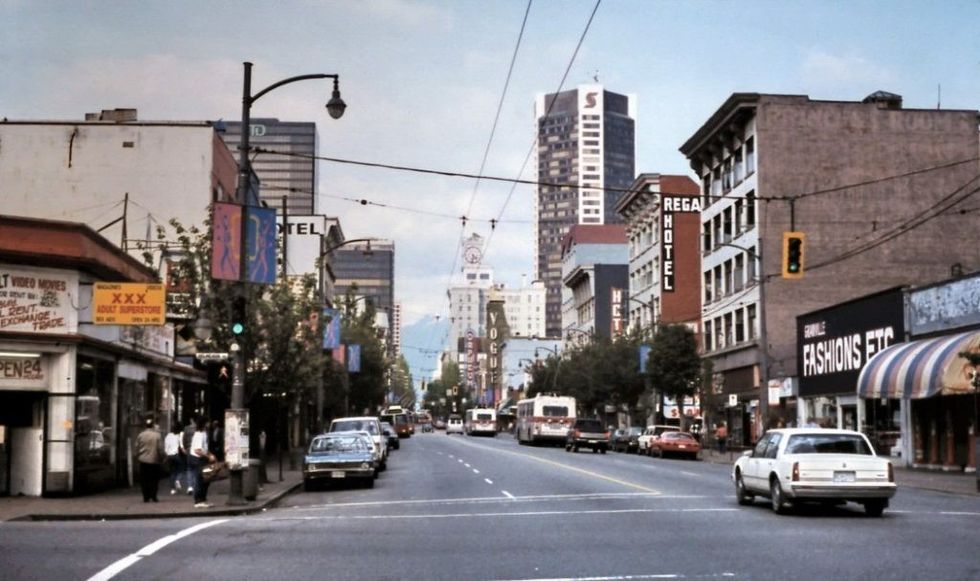
Then, in 2003, Vancouver won its bid to host the 2010 Winter Olympics. By 2006, in hopes of taking advantage of the federal and provincial government's increased motivation to invest in Vancouver, Mayor Sam Sullivan introduced Project Civil City, which he called "a framework for action to address the issue of public disorder in the City of Vancouver" and made special mention of Granville Street with an action item to "address public disorder problems in the Granville Entertainment District."
By the time the 2010 Winter Olympics came and passed, the "Civil City" image Sullivan was aiming for had become, in actuality and among the people, "No Fun City" as a result of rising real estate prices and restrictive bylaws in the Granville area making it difficult to own and operate entertainment venues.
Granville Street: Today and Tomorrow
Like most of the retail and hospitality world, Granville Street was greatly impacted by the COVID-19 pandemic. According to the Downtown Vancouver Business Improvement Association (DVBIA), a non-profit that represents 7,000 businesses located within the downtown core, at least 84 businesses in Downtown Vancouver have closed since 2020, 45% of which were independent businesses. "Granville Street [...] was most impacted by business closures," the DVBIA said. "As of Q1 2021, there were 31 vacant storefronts on Granville Street, four of which are currently awaiting or undergoing redevelopment."
Numerous hotels have also closed since 2020 -- though not all because of the pandemic. Those include the Four Seasons Hotel adjacent to Pacific Centre; The Trump Hotel on West Georgia Street, which re-opened as the Paradox Hotel in 2022; and the Howard Johnson Hotel on Granville Street, which was purchased by BC Housing and turned into temporary supportive housing.
In early 2021, the DVBIA commissioned Resonance Consultancy to generate a report called Granville St Reimagining. The report, Resonance says, "addresses key issues for a street that was already in decline before the pandemic, and provides recommendations on how to both revitalize its commercial enterprises and reposition it as the heart of a vibrant arts and entertainment corridor that will bring locals and visitors together in the city."
The report found that Granville Street has declined as a shopping destination in recent years, falling to 2008 levels where only a third of visitors to the area viewed it as such. Granville Street has also declined as a dining destination, from 34% viewing it as such in 2008 to just 17% -- half as many -- in 2019.
"In the past decade, locals and visitors have been increasingly more interested in Gastown and Yaletown," Resonance found. "Granville Street is now perceived as the most insecure area in Downtown Vancouver for both locals and tourists. Today, the street is mainly used as a transit corridor by Vancouverites commuting to Downtown Vancouver during the day, and as a nightlife destination in the evening."
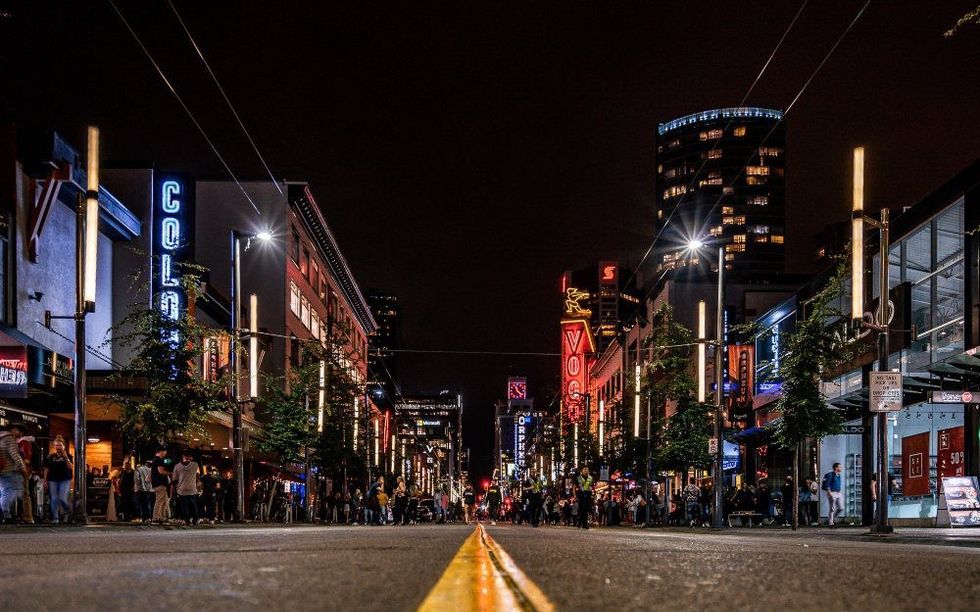
The report also found that Granville Street has become increasingly "stagnated" as it faces challenges around homelessness and safety, two problems that exist in many other places outside of Granville Street, but have come to -- unfortunately -- define the area.
In their annual Granville Entertainment District Safety Survey, Good Night Out -- a local non-profit focused on preventing and responding to sexual harassment and sexual assault -- found that a staggering 89% of respondents said they feel unsafe in the Granville Entertainment District, with 85% attributing it to "disorderly patrons," 52% citing "witnessing harassment" (gendered, racial, or homophobic), and 49% saying it was a result of "witnessing violence."
Those problems became particularly prominent in 2022 as Vancouver moved closer towards completely re-opening and moving past the pandemic, and addressing public safety -- in the Granville area, but also the Downtown Eastside, and Chinatown in particular -- played a big role in the election of Mayor Ken Sim and the ABC Vancouver supermajority on City Council.
Which brings us to the current Granville Street renewal plan, officially called the Granville Street Planning Program. The program, which City staff proposed to Council in mid-January, and was approved by Council on January 31, is a response to recommendations made in recent years that were championed by Councilor Sarah Kirby-Yung, who worked in the hospitality and tourism sector previously. The plan will focus on a particular section of Granville Street: beyond Robson Street, past the Commodore Ballroom and Vogue Theatre, to Drake Street.
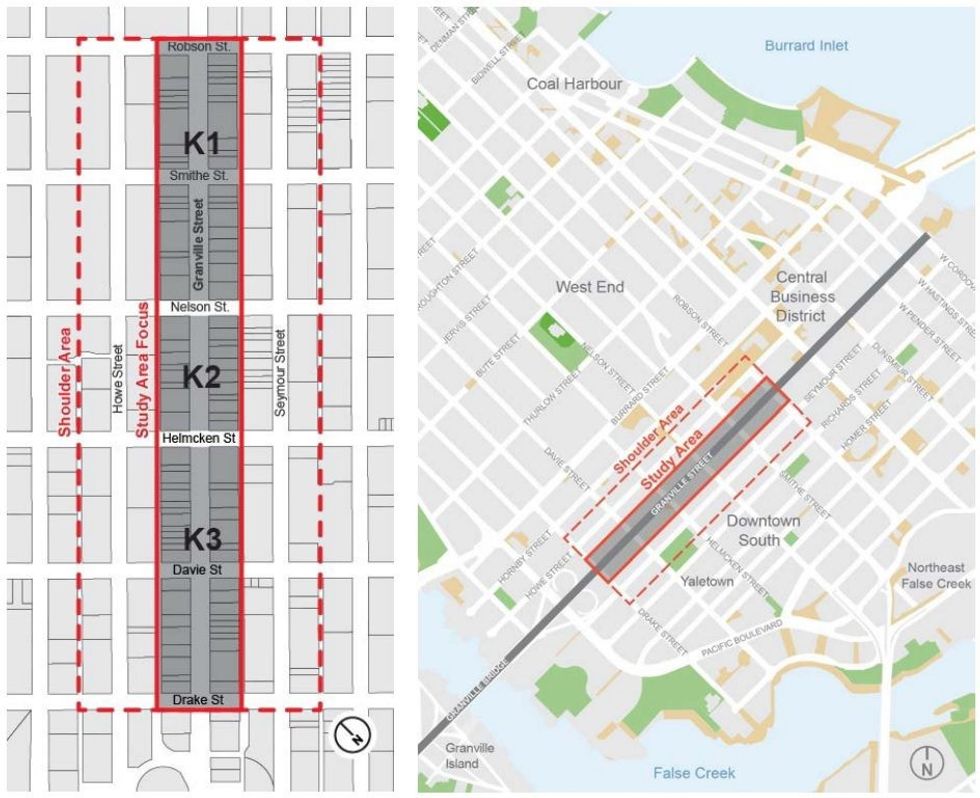
As mentioned, the program seeks to identify ways to restore Granville Street and the Granville Entertainment District back to its former standing and glory, with an additional emphasis on keeping culture at the heart of the street, expanding day and night-time activity, preserving the street's defining character, diversifying the economic activity, prioritizing pedestrians, improving transit access, prioritizing reconciliation, preserving access to sunlight and views, and clarifying the role of housing.
Development of the program plan is expected to take approximately 18 months, with policy updates and recommendations scheduled to be presented to council in Q3 2024. During that period, an Interim Rezoning Policy will be in effect, where the City will not consider any rezoning applications or policy enquiries, in order to prevent land speculation.
The big exception, however, with emphasis on the "big," is the rezoning application for 800-876 Granville Street that was first publicized in 2021. The proposal, from Bonnis Properties, is for a 17-storey mixed-use building, with approximately 470,000 sq. ft of office space, 100,000 sq. ft of new retail space, 50,000 sq. ft of restaurant space, and 19,000 sq. ft of space to be used as a performance venue. The proposal includes preserving and bridging the new building to the existing Commodore Ballroom and Commodore Lanes that occupy a significant portion of the site, in addition to retaining the State Hotel, which is currently being used as a single room occupancy housing building.
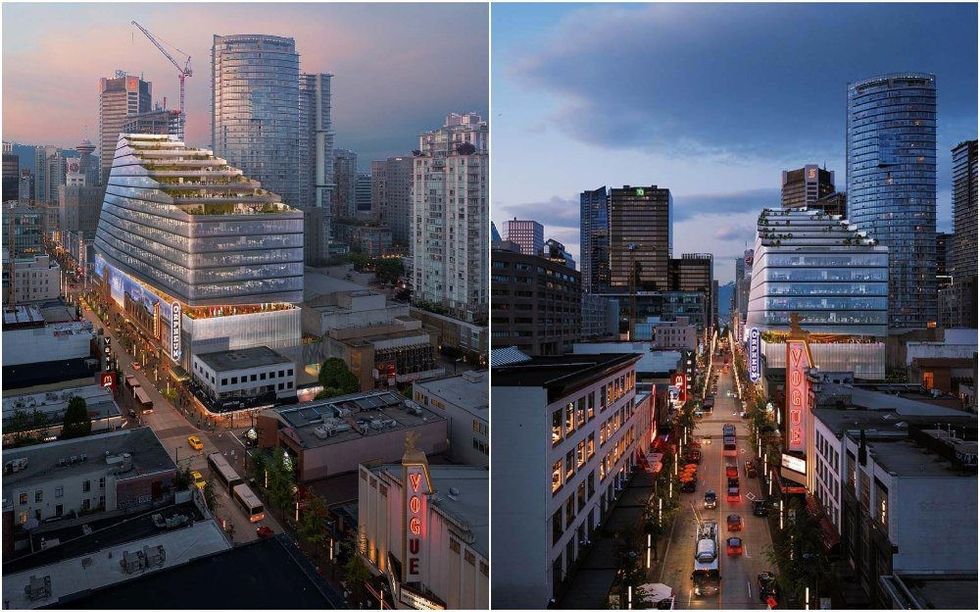
The proposal is currently non-compliant with existing policies, but Council directed staff to explore the potential economic, cultural, and heritage values of the proposal in 2022, and the application will undergo an "enhanced" rezoning process concurrently with the Granville Street Planning Program to ensure that it aligns with the City's priorities for the Granville Entertainment District. Public engagement is expected to be held at multiple points during the process, before a final public hearing.
The development is being designed by Perkins & Will, and would have a modern sheen and a big physical stature that's in contrast to its neighbours. Symbolically, the building would be a monument to the City's vision for Granville Street and its future. It would be an exaggeration to say that the district has been reduced to metaphorical ashes, but the City of Vancouver is nonetheless hoping that Granville Street re-emerges like a phoenix: resurrected, transformed, and immortal.
- Interim Rezoning Policy To Come As City Implements Vancouver Plan ›
- Vancouver's Granville Retail Complex Put Up For Sale ›
- Bonnis Properties Cancelling 17-Storey Granville Street Redevelopment ›
- Vancouver's Bonnis Properties Cures Default On $56M Loan In Los Angeles ›
- Vancouver Unveils Bold 20-Year Vision to Revitalize Granville Street ›
